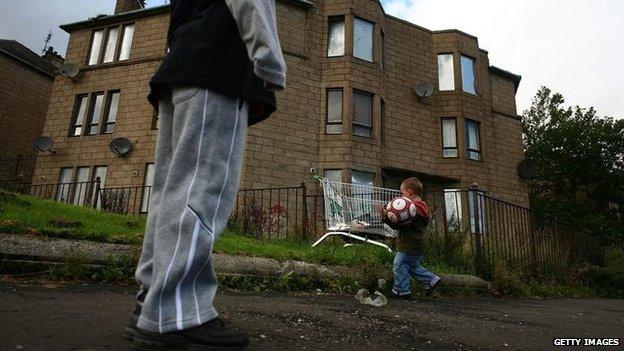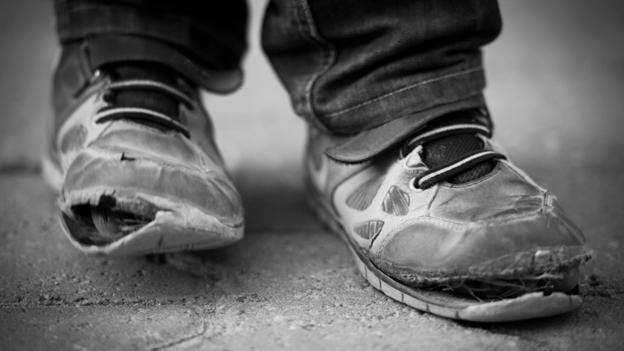Reality Check: How should child poverty be tackled?
- Published

THE SNP has said it wants to tackle child poverty. It cites a forecast by the Institute for Fiscal Studies (IFS) that there will be more than a million more children living in poverty by the end of this decade.
Nicola Sturgeon, the SNP leader and first minister, claimed this means 100,000 more Scottish children - if current government policies are continued.
The SNP has set out policies to reduce child poverty, external, including a higher minimum wage, an end to the coalition government's freeze on child benefit and tax credit, and more childcare.
The claim
In 2013, the IFS published a report into child poverty in Northern Ireland, external. It looked beyond the province, and claimed that the number of children in the UK affected by relative poverty was set to rise by 1.1m over this decade.
Relative poverty is the measure of households living on less than 60% of median income. And median income is the point at which half of people are paid more and half of people are paid less.
The IFS projection is of a rise to more than five million children in the UK living in poverty by 2020.
By the same count, the number of Scottish children in poverty would rise over the decade by about 100,000. So that rise is not about the next five years, as the SNP claims, but about the whole decade.
In percentage terms, that is a rise of those in relative poverty from 21.4% in 2011 to 25.5% forecast for this year, to 28.4% by 2020.
What does it mean in practice and in pounds?
The Child Poverty Action Group, external (CPAG) says this is about growing up in families without the resources to "obtain the type of diet, participate in the activities and have the living conditions and amenities" which are the norm in 21st Century Scotland.
The actual amount is related to the family size and shape.
CPAG cites 2012-13 data which shows a lone parent family with two children (aged 5 and 14) is living in poverty if they are living on less than £269 per week (after housing costs have been deducted).
A two-parent family with two children (aged 5 and 14) is living in poverty if they are living on less than £364 a week (after deduction of housing costs).
Turning point
The Scottish government has published slightly different figures, external which reflect what has been measured rather than forecasts. These reflect on the success of recent policy in bringing child poverty down.
In 1995-96, there were 330,000 Scottish children living in relative poverty. This was largely through improved child benefit and child tax credits, as well as improvements in employment rates of their parents, that had fallen to 220,000 by 2012-13 - a fall from 33% of children to 22%.
According to Jim McCormick, of the Joseph Rowntree Foundation, that may have been the turning point, because that was the year at which the uprating of child benefits began to fall below inflation. It has now been frozen.
But the IFS forecasts in 2013, he warns, were based on assumptions that may have changed.

While child welfare payments rose sharply under the last Labour government, and are now being pared back, two other drivers of poverty have become important mid-way through this decade. One is low-wage jobs, in that parents may find employment, but it may not be enough to pull them out of poverty.
The IFS's Robert Joyce asked why poor children have been worse off in absolute terms recently?
His answer: "Income from state benefits comprises 62% of the household income of the poorest 30% of children, but most of the remaining minority is earned income, and it is earned income that fell most sharply in real terms in the immediate aftermath of the recession".
Another change in the composition of child poverty causes is private rented housing.
It has doubled in scale (from a low base) in the past decade. With costs high, housing benefit is important to those in poverty, unless they start work, and housing benefit is reduced sharply, creating a financial trap in which people can lose money by starting to work.
'Through the cracks'
A law was passed in 2010 requiring the UK government to end child poverty by 2020.
The IFS says that looks very unlikely to happen under current plans to reduce welfare spending.
Most of the £12bn proposed welfare budget cuts in the most recent Budget from the Chancellor, George Osborne, are not being detailed ahead of election day.
The Conservative Party argues that rising employment and reform of welfare towards the universal benefit should go at least some way to reversing some of the trends that these policy analysts have emphasised. Another research project has found that is unlikely to be sufficient.
Labour says it will increase the minimum wage, extend the living wage, ban zero hours contracts, and establish a £175m Scottish anti-poverty fund "to support those who fall through the cracks".
Liberal Democrats have distanced themselves from the scale of welfare cuts proposed by George Osborne, saying they will weight the fiscal changes differently if they return to government.
Independent commission
It may be worth noting one downside to raising the minimum wage: it could lead to a reduction in the growth in employment.
The way it has been calculated by labour market economists for 16 years is that it rises as high as possible without damaging employment. All the main parties, in different ways, are moving away from that consensus of leaving it to an independent commission.
In a recent paper on trends in child poverty, external, the IFS noted that the UK government has been consulting on changes to the way poverty is measured, to get away from simple measures of income each year.
Their consultation suggested including measures of worklessness, debt, access to quality education, parental skill level and parental health.
However, there has been no conclusion to that, and the law still says that child poverty - under the conventional measure - has to end by 2020-21.

Election 2015 - Reality Check

What's the truth behind the politicians' claims on the campaign trail? Our experts investigate the facts, and wider stories, behind the soundbites.
Read latest updates or follow us on Twitter @BBCRealityCheck, external
